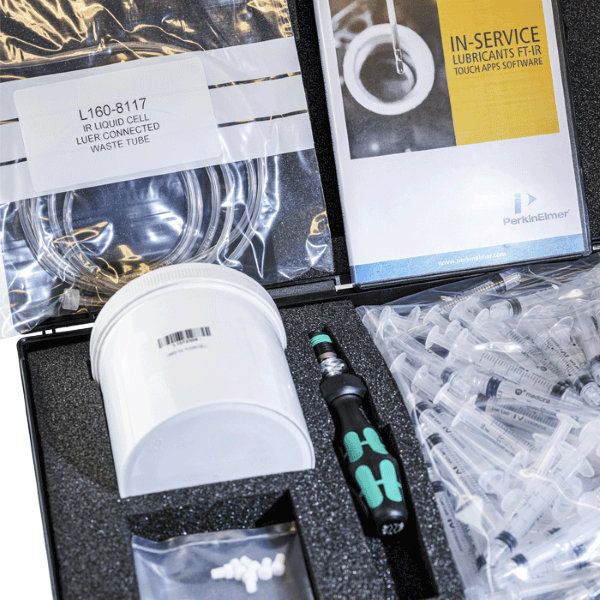Machinery and equipment relies on effective lubrication. Yet greases – an important lubricant commonly used in axles, bearings, and gears – are notoriously difficult to test and analyze.
When it comes to testing grease, there are many different methods and they all have varying degrees of effectiveness. Among them is Fourier Transform Infrared (FT-IR) spectroscopy, which uses the infrared spectrum to help determine whether there is a chemical change within the grease.
This is a common process that helps test for oxidation, nitration, sulfation, and contamination.
Historically, grease analysis using FT-IR has relied on a surface technique using Attenuated Total Reflection – or ATR. The ATR method is a surface analysis technique and is not fit for analysis of low concentration additives in the sample. An alternative method of analysis that is more effective is to use transmission analysis.
By combining PerkinElmer’s Spectrum Two IR Spectrometer with the Specac Pearl sampling accessory, radiation from the FT-IR’s infrared beam can be passed through the cell to penetrate the grease and provide far more reliable and consistent data.
The Specac Pearl’s unique design allows for a small amount of grease to be placed in the sampling compartment for quick and consistent testing.
The Spectrum Two covers a frequency range from 4,000 to 550 waves per centimeter (cm-1) and is suitable for all common tests for lubrication analysis, such as ASTM E2412, the JOAP test and ASTM D7418.

Whereas other methods would typically require samples to be collected and sent back to the laboratory for analysis, PerkinElmer’s solution boasts a small footprint and is lightweight, making it completely portable and ideal for use in the field.
This compact spectrometer can easily be transported, connected to a laptop and used with software in PerkinElmer’s FT-IR In-Service Lubricants Application Pack to analyze lubricants and greases onsite. Its fast warm-up time and ease of use allows grease samples to be instantly identified and tested for compatibility and any signs of contamination.
Incompatible lubricants are a common problem within manufacturing and processing so having the right grease for the right application is absolutely vital.
With PerkinElmer’s patented FT-IR technology, users can rely on comprehensive and easily-repeatable analysis that is fast, reliable, and responsive. To find out more about the Spectrum Two IR Spectrometer, visit PerkinElmer’s website at https://www.perkinelmer.com/product/spectrum-two-ft-ir-sp10-s-w-dtgs-apv-l160000f